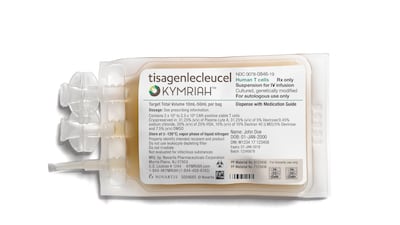A substantial breakthrough in personalised gene therapy for cancer treatment is the latest indication of a major leap forward in the way we fight illness and disease.
The US Food and Drug Administration this week approved the first gene therapy in America to be available to fight leukaemia.
The announcement that Novartis drug Kymriah has been approved points to a potentially huge development in healthcare, where genetic advances can be used to help fight life-threatening diseases and prolong life.
Doctors in the UAE have hailed the breakthrough drug and said that the use of genetic advances could shape the future of healthcare by helping detect susceptibility of certain health conditions so a patient’s treatment can be mapped out in advance.
Kymriah could also be the gateway to a new breed of medication, allowing a patient’s cells to be genetically altered to help fight illness.
The drug is a novel immunocellular therapy and a one-time treatment that uses a patient's own T cells to fight leukaemia.
Joseph Jimenez, drug manufacturer Novartis’ chief executive, said: “Five years ago, we began collaborating with the University of Pennsylvania and invested in further developing and bringing what we believed would be a paradigm-changing immunocellular therapy to cancer patients in dire need.
“With the approval of Kymriah, we are once again delivering on our commitment to change the course of cancer care."
_______________________
Read more:
The end of inherited diseases?
Hope that DNA profiling will be at centre of clinical care
Pros and cons of a DNA test to detect potential illnesses
_______________________
In 2014, World Health Organisation figures showed there were 700 male and 500 female cancer deaths in the UAE.
Leukaemia was responsible for 7.2 per cent of deaths in both men and women but breast cancer remains the most common killer in women, accounting for 24.1 per cent of deaths.
Men are more susceptible to lung and respiratory-related cancers, which are responsible for 16.4 per cent of cancer deaths.
In August, American scientists revealed a similar breakthrough in how serious health conditions could be tackled in future.
They were successfully able to alter the DNA in defective embryos so they were no longer programmed to develop heart failure.
Gene-editing tool Crispr-Cas9 has been used to permanently modify genes within organisms, attacking mutations responsible for common inherited disease.
Although controversial and at an early stage of experimentation, it has been described as a potential game changer in the future of healthcare.
Dr Carrie Starkie, a paediatrician who moved to Abu Dhabi from the US, said the arrival of gene therapy and screening is potentially huge.
“In the US, we have similar difficulties with sickle cell anaemia to the problems faced by populations here with genetic problems like spinal muscular atrophy,” she said.
“As the knowledge base increases for genetic screening, so does the potential to shape future healthcare depending on the nuances of the condition to help people make informed choices.
“Parents can be genetically screened to see if they are carriers of the mutation that could be passed on to children.
“Specific testing can identify where parents are in the risk spectrum, and then they can make decisions accordingly.”
The Kymriah drug is the first therapy based on gene transfer approved by the US FDA.
“The first genetically modified cell therapy to be approved by the FDA is an exciting step forward,” said Professor Peter Johnson, Cancer Research UK’s chief clinician.
“Research has shown how it is possible to reprogramme immune cells into recognising cancers that they had previously missed.
“Because normal chemotherapy works very well, not many people with this type of leukaemia would need this new treatment.
“But if it works for older patients or those with other types of cancer it could become an important new option.
“We still have a lot to learn about how to use it safely and who might benefit from it, so it is important to recognise this is just a first step.”
Although concerns remain over the drug’s toxicity, clinical trials have yielded considerable success – including saving the life of a year-old British girl at Great Ormond Street Hospital in London.
Expense could, however, be a serious issue as the drug is likely to cost about Dh1.6 million for a one-off dose.
"We are so proud to be part of this historic moment in cancer treatment and are deeply grateful to our researchers, collaborators and the patients and families who participated in the Kymriah clinical programme,” said Bruno Strigini, the chief executive of Novartis Oncology.


